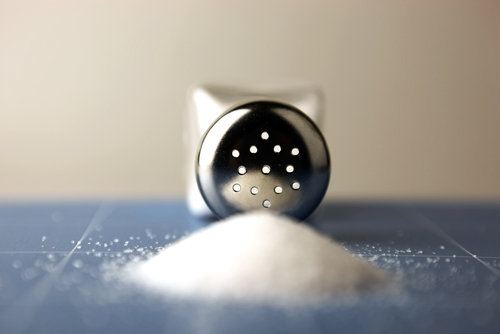Some health “rules” seem to have been around since the beginning of time: cut out saturated fat, drink eight glasses of water a day, and the old standard – cut down on your salt intake. This last rule has especially been pushed onto those who suffer from high blood pressure.
According to the Centers for Disease Control roughly 70 million Americans (about 1 out of 3 adults) suffer from high blood pressure and only about half of these individuals know what’s causing their high BP numbers or have their hypertension under control. With yearly healthcare costs averaging close to $46 billion because of high blood pressure-related incidents, it’s easy to see why the government has set certain health guidelines for all Americans.
For instance, it is currently recommended that a healthy person consume no more than 2,300 milligrams (about 1 teaspoon) of sodium per day. However, people over the age of 50, African Americans, and anyone with high blood pressure or kidney problems are advised to limit their sodium intake to 1,500 milligrams only. But now some nutritional and medical experts are beginning to question the wisdom in this advice.
Dr. Steven Nissen is the Chairman of Cardiovascular Medicine at Ohio’s Cleveland Clinic and one expert who has started to question why the medical community has been making a recommendation about limiting salt intake that has no solid evidence to support it. “We have been stuck in a time warp with this advice,” he said.
One Study Offers Surprising Findings
According to Nissen there are now several studies that are able to poke holes in the original American Heart Association guidelines that recommend those with hypertension limit their salt intake to no more than 1,500 milligrams a day. One study, which was published in the New England Journal of Medicine, tracked the sodium intake of nearly 30,000 people, and the findings were surprising.
The Irish researchers found that those individuals who consumed large daily quantities of salt (6,000 to 7,000 milligrams) were at higher risk for heart attacks and stroke.
That part wasn’t surprising.
What was surprising was that they found individuals who consumed lower than normal quantities of sodium were equally at risk for the same cardiovascular problems.
Nissen believes this finding is incredibly important because it begs the question as to whether or not someone who consumes the average 3,000 milligrams a day would benefit or not from a reduction.
But health experts agree that more and better studies should be conducted to determine whether a patient with hypertension will be helped or harmed by the current recommendation.
Can We All Just Agree on a Number Already?
Alice H. Lichtenstein, the director of the Cardiovascular Nutrition Laboratory at Tufts University and an AHA spokeswoman, believes the findings from the Irish study may be inaccurate.
“When we looked at studies for the National Institutes of Medicine, we couldn’t rule out the strong possibility that people with lower sodium intake were sicker subjects and had a greatly diminished food intake in general, and might have been misreporting their intake,” she said.
Lichtenstein did add that although the data supports lowering excessive sodium intakes down to about 2,300 milligrams a day, there is no evidence or data that supports the need to bring those levels all the way down to 1,500 milligrams, as the current guidelines recommend. Like Nissen, she agrees there needs to be more studies to determine the right answer.
While many health experts are just now beginning to question the current salt recommendations, the consumer advocacy group, Center for Science in the Public Interest (CSPI), has stated it believes there is too little evidence to change the current salt recommendations.
“There is a near-global scientific consensus that most people consume too much salt, largely from packaged and restaurant foods,” said Bonnie Liebman, CSPI’s Director of Nutrition. “Given that two out of three American adults has either hypertension or prehypertension, it would be foolish to reverse that advice based on recent flawed studies.”
While the medical and nutritional experts fight over what is the right amount of salt intake, millions of Americans will remain unable to get their numbers under control and remain dependent on their blood pressure medications.
Are you sick of the side-effects of your blood pressure medication, like headaches, weird rashes, and insomnia?
Do you want to get to the root cause of your high blood pressure instead of just constantly masking the symptoms?
Wouldn’t it be great if you could lower your blood pressure using a simple and all-natural method and get your health and energy back?
On the following page, one doctor will share some information with you that drug companies don’t want you to know about.
You’ll learn how how he’s worked with patients all around the world to identify the REAL reasons they struggle with high blood pressure.
…and helped thousands finally get their issues under control naturally with a simple evaluation you can do right in the comfort of your own home.
Sound too good to be true?
Watch the video on the next page to learn more about this doctor’s method and get your blood pressure numbers down naturally – with a plan designed just for you.
 Validating...
Validating... 






Leave a Reply